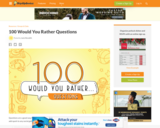
These are great discussion or quick write prompts.
- Subject:
- English Language Arts
- Material Type:
- Activity/Lab
- Author:
- Janis Meredith
- Date Added:
- 10/24/2022

These are great discussion or quick write prompts.
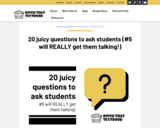
"A great question is a springboard into a fascinating discussion. Phrase it the right way and students will start thinking. Then they'll start talking. Then you won't be able to get them to stop!
Great questions can make the difference between a good learning activity and a great one."
This includes 20 questions as well as many ideas to make your own questions including - student interests, audio, images, video, would you rather, summaries, lists, fantasies, mysteries.
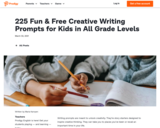
Writing prompts for kids help students:
- Express themselves and their creativity
- Grasp lifelong literacy skills and concepts
- Tell their own stories and build self-confidence
- Develop a growth mindset when it comes to their writing skills
- Writing is like a muscle — it takes practice to build up skills. Luckily, we put together a list of over 200 writing prompts to help your students get started.
Contents include:
- Creative writing prompts
- Fun writing prompts
- Persuasive writing prompts
- Social emotional learning journal prompts
- Math writing prompts
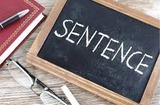
Find mini lessons and anchor charts for K-2 based on The Writing Revolution's sentence-level activities.This resource has everything you need to start using The Writing Revolution at the sentence-level in your classroom or school. We recommend that you have a copy of this book to use as a support in your classroom to assist with implementation (especially if you are the ELA teacher). This is an outstanding resource.
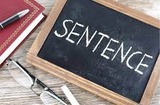
Find mini lessons and anchor charts for Grades 3-5 based on The Writing Revolution's sentence-level activities.This resource has everything you need to start using The Writing Revolution at the sentence-level in your classroom or school. We recommend that you have a copy of this book to use as a support in your classroom to assist with implementation (especially if you are the ELA teacher). This is an outstanding resource.
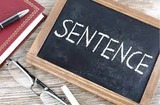
Find mini lessons and anchor charts for Grades 6-9 based on The Writing Revolution's sentence-level activities.This resource has everything you need to start using The Writing Revolution at the sentence-level in your classroom or school. We recommend that you have a copy of this book to use as a support in your classroom to assist with implementation (especially if you are the ELA teacher). This is an outstanding resource.
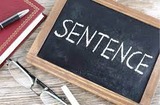
Find mini lessons and anchor charts for Grades 10-12 based on The Writing Revolution's sentence-level activities.This resource has everything you need to start using The Writing Revolution at the sentence-level in your classroom or school. We recommend that you have a copy of this book to use as a support in your classroom to assist with implementation (especially if you are the ELA teacher). This is an outstanding resource.
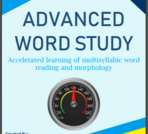
This has everything you need to get started teaching morphology!
"This resource is designed for teachers and students with limited experience with advanced phonics instruction. It provides an accelerated scope and sequence of syllable types and common prefixes, suffixes, and root words. The lessons include detailed descriptions, visual examples, and practice pages.
This resource will help educators teach the understanding that words consist of bases that convey meaning and that can be modified with affixes (prefixes and suffixes) to change the word's meaning. It explains how to apply their morphological knowledge to spell and read longer and more complex words." - ONLit
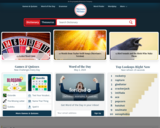
Use as a dictonary, to do word of the day with students or a thesaurus. It also has games.

Pobble365 helps to keep students writing. Every day, Pobble365 provides a weird, wonderful, and/or thought provoking image to spark ideas for discussions and writing. It is free and along with a different idea-inspiring image every day, Pobble365 provides a story starter, discussion questions, as well as sentence challenges and “sick sentences” to build language skills. If students don’t have online access, images and writing supports can be printed and photocopied.
The activities include a prompt, sentences stems, vocabulary bank, questions, and challenges to help you scaffold your lesson.
You will need to sign up and make an account to access the resources, but it is free to do so and each day includes a free prompt. You can also create your own!
Get your students writing every single day!
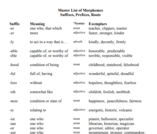
prefixes
suffixes
roots
syntax
examples
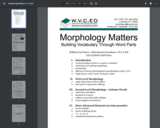
This resource provides a structured approach to teaching vocabulary through understanding word parts.
The resource covers:
*Introduction: Differentiates between active and passive vocabulary, discusses motivation for teaching morphology, and explains terminology.
*First Level Morphology: Focuses on Anglo-Saxon base words, affixes, and parts of speech.
*Second Level Morphology: Explores Latin bases, affixes, lesson elements, and distinctions between suffixes and final stable syllables.
*Advanced Elements: Introduces Greek templates, combining forms, and assimilated prefixes.
This resource aims to enhance vocabulary acquisition by dissecting word structures and origins, offering both foundational and advanced strategies for educators.
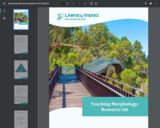
"This is a comprehensive guide for morphology instruction – it explains the layers of the English language, walks through a suggested sequence of instruction, and includes sample lesson templates complete with word sums and matrices." - OnLit
*sequence
*greek/latin/anglo saxon roots
*word matrix - word maps
*games
*list of morphemes
*prefixes and suffixes
*multi-morphic template
*activity cards

You will need to provide you email to download these excellent (and free) template from Jennifer Findley to teach morphology!
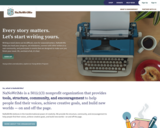
This site is for the young writer who is itching to write a novel … in 30 days. Lesson plans from prewriting to publishing help kids to develop and fine-tune their writing skills. This is a great resource for students who are up for using their imagination to create another world or simply tell their story. From lower elementary to high school.
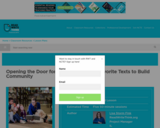
In this lesson, students build classroom community by exploring environmental print and a teacher-created display that focuses on a favorite book. They then create and share their own presentations.
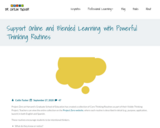
Project Zero at Harvard’s Graduate School of Education has created a collection of Core Thinking Routines as part of their Visible Thinking Project. Teachers can view the entire collection on the Project Zero website (https://pz.harvard.edu/thinking-routines#CoreThinkingRoutines), where each routine is described in detail (e.g., purpose, application, launch) in both English and Spanish.
These routines encourage students to be intentional thinkers.
What do they know or notice?
What is their perspective or position on an issue or idea?
How can they support their position or thinking?
What do they wonder? What are they confused about?
How has their thinking changed? What caused that change?
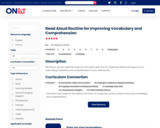
This is a fabulous read aloud routine to use with practically any age of students. This routine takes about a half hour while reading one passage.
This routine can help build language comprehension, fluency, vocabulary and background knowledge.
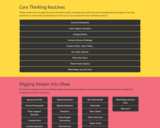
This amazing toolbox organizes Thinking Routines into categories.
When you open a routine, go to the section for Resource Links to access an explanation/lesson on how to use this tool.
Tools or strategies are divided into these categories (a few examples are listed but there are many more):
*Core thinking routines (E.g., See, think, wonder, What makes you say that?)
*Digging Deeper Into Ideas (E.g., Outside in, Layers, Fact or fiction?)
*Introducing and exploring ideas (Lenses, Step in - step out - step back)
*Objects and systems (Creative hunt, Parts-people-interactions)
*Perspective taking (Options explosion, True for who?)
*Perspectives, controversies and Dilemmas (Tug for truth, Sticking points, 4Cs)
*Possibilities and analogies (3-2-1 bridge, Creative quesitons)
*Synthesizing and Organizing Ideas (+1 Routine, Take note, Headlines)
*With Art or Objects (Creative comparisons, Looking: 10x2, Thinking with images)
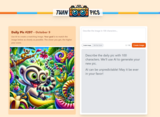
"Use AI to create a matching image. Your goal is to match the image below as closely as possible. The closer you get, the higher your score."
This is a great way to teach students to be concise in their writing, how to use description as well as to learn how to write good AI prompts (not to mention it's really fun!).